-
Study finds correlation between injection wells and small earthquakes
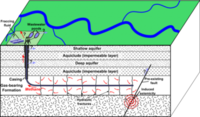
Most earthquakes in the Barnett Shale region of North Texas occur within a few miles of one or more injection wells used to dispose of wastes associated with petroleum production such as hydraulic fracturing fluids, according to new research
-
-
Study finds substantial water pollution risks from fracking
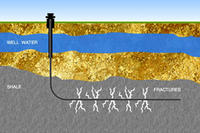
The Marcellus Shale region covers approximately 124,000 square kilometers from New York to West Virginia and is being intensely developed; a new study finds that the disposal of contaminated wastewater from hydraulic fracturing — commonly known as fracking — wells producing natural gas in the Marcellus Shale region poses substantial potential risks of river and other water pollution
-
-
Seeing through walls, clearly
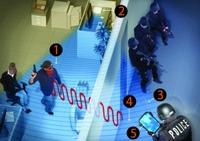
Research and tests show, for the first time, the ability to use t passive WiFi radar for through-the-wall (TTW) detection of moving personnel – and do so covertly
-
-
New forensic tool automates RAM forensic investigations
New tool enables computer forensic investigators to analyze and make use of information contained in volatile memory; memory analysis produces important, case-relevant data for investigators that cannot be obtained from disk analysis, such as running applications, open files, and active network connections
-
-
Canadian company offers the first treatment to neutralize red mud
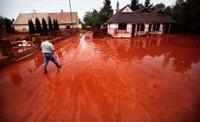
Red mud is the most significant waste product of the traditional Bayer process for aluminum production; the industry produces more than 100 million tons of red mud a year, of which less than 5 percent is be reused; the rest is stored in ponds and reservoirs, posing serious environmental and economic risk; on 4 October 2010, for example, a flood of toxic red mud devastated Hungary after a retaining dyke ruptured, causing an ecological disaster; Canadian company Orbite Aluminae offers a technology to tackle the aluminum industry’s most serious problem
-
-
Improving landmine detection – and air travel safety
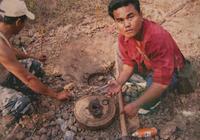
It is estimated that there are about 110 million active landmines lurking underground in sixty-four countries across the globe; each year as many as 25,000 people, most of them civilians, are maimed or killed by landmines; the mines not only kill and maim, they can paralyze communities by limiting the use of land for farming and roads for trade; researchers offer a better way to detect landmines – a method which can also be used in airports to help thwart possible terrorist threats
-
-
Forget blizzards and hurricanes, heat waves are deadliest

Tornadoes, blizzards, and hurricanes get most of our attention because their destructive power makes for imagery the media cannot ignore; for sheer killing power, however, heat waves do in far more people than even the most devastating hurricane; Hurricane Katrina and its floods, which devastated New Orleans and the Gulf Coast in 2005, exacted a death toll of 1,836 people; the heat wave which enveloped Europe during the course of three excruciating weeks in August 2003 of that year, killed an estimated 70,000 people
-
-
Improving oil recovery, aiding environmental cleanup
Researchers have taken a new look at an old, but seldom-used technique developed by the petroleum industry to recover oil, and learned more about why it works, how it could be improved, and how it might be able to make a comeback not only in oil recovery but also environmental cleanup
-
-
Federal mapping tool used in Gulf spill expanded to Arctic
A new federal interactive online mapping tool used by emergency responders during the Deepwater Horizon oil spill has been expanded to include the Arctic, and will help address numerous challenges in the Arctic posed by increasing ship traffic and proposed energy development
-
-
Earthquake risk looms large in the Pacific Northwest
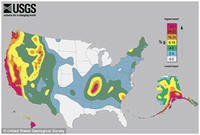
A comprehensive analysis of the Cascadia Subduction Zone off the Pacific Northwest coast confirms that the region has had numerous earthquakes over the past 10,000 years, and suggests that the southern Oregon coast may be most vulnerable based on recurrence frequency
-
-
Earth’s oceans, ecosystems still absorbing about half the greenhouse gases emitted by people
Earth’s oceans, forests, and other ecosystems continue to soak up about half the carbon dioxide emitted into the atmosphere by human activities, even as those emissions have increased, according to a study published yesterday in the journal Nature
-
-
New STEM education initiative in Virginia
A 2010 Georgetown University study found that by 2018, Virginia will need to fill more than 400,000 science, technology, engineering, and applied mathematics (STEAM)-related jobs, while the country will confront a shortage of three million STEAM-educated college graduates; Virginia Tech and the Virginia STEAM Academy are forming a strategic partnership to address critical STEAM education needs in the Commonwealth of Virginia
-
-
Under industry pressure, DHS drops chemical plant employee screening proposal

Security experts agree that short of a nuclear attack on a U.S. city, the most casualty-heavy disaster would occur as a result of an accident in, or a terrorist attack on, a chemical plant which would release a cloud of toxic fumes; there are about 15,000 plants in the United States which produce, process, use, or store volatile and toxic chemicals; more than 300 of the these plants are so close to large population centers, that a chemical release in any one of them would cause more than 50,000 casualties; DHS wanted to have employees in these plants screened for potential ties terrorism, but the chemical industry objected, saying this would be too costly; last Thursday DHS pulled the proposal
-
-
New, affordable instant warnings of bridge collapse
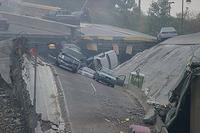
The Federal Bureau of Transportation lists nearly 70,000 U.S. bridges as “structurally deficient,” requiring extra surveillance; in addition, more than 77,000 others are categorized as “obsolete” — exceeding their intended lifespan and carrying loads greater than they were designed to handle; researchers developed a new technology for monitoring these 150,000 aging U.S. highway bridges
-
-
A second look at off-shore use of vertical-axis wind turbines

Wind energy researchers are re-evaluating vertical axis wind turbines (VAWTs) to help solve some of the problems of generating energy from offshore breezes; though VAWTs have been around since the earliest days of wind energy research, VAWT architecture could transform offshore wind technology
-
More headlines
The long view
New Technology is Keeping the Skies Safe
DHS S&T Baggage, Cargo, and People Screening (BCP) Program develops state-of-the-art screening solutions to help secure airspace, communities, and borders
Factories First: Winning the Drone War Before It Starts
Wars are won by factories before they are won on the battlefield,Martin C. Feldmann writes, noting that the United States lacks the manufacturing depth for the coming drone age. Rectifying this situation “will take far more than procurement tweaks,” Feldmann writes. “It demands a national-level, wartime-scale industrial mobilization.”
How Artificial General Intelligence Could Affect the Rise and Fall of Nations
By Barry Pavel et al.
Visions for potential AGI futures: A new report from RAND aims to stimulate thinking among policymakers about possible impacts of the development of artificial general intelligence (AGI) on geopolitics and the world order.
Smaller Nuclear Reactors Spark Renewed Interest in a Once-Shunned Energy Source
By David Montgomery
In the past two years, half the states have taken action to promote nuclear power, from creating nuclear task forces to integrating nuclear into long-term energy plans.
Keeping the Lights on with Nuclear Waste: Radiochemistry Transforms Nuclear Waste into Strategic Materials
By John Domol
How UNLV radiochemistry is pioneering the future of energy in the Southwest by salvaging strategic materials from nuclear dumps –and making it safe.
Model Predicts Long-Term Effects of Nuclear Waste on Underground Disposal Systems
By Zach Winn
The simulations matched results from an underground lab experiment in Switzerland, suggesting modeling could be used to validate the safety of nuclear disposal sites.
